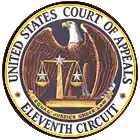Smith v. Board of School Commissioners of Mobile County
Smith v. Board of School Commissioners of Mobile County, 827 F.2d 684 (11th Cir. 1987),[1] was a lawsuit in which the United States Court of Appeals for the Eleventh Circuit held that the Mobile County Public School System could use textbooks which purportedly promoted "secular humanism", characterized by the complainants as a religion.
| Smith v. Board of School Commissioners of Mobile County | |
|---|---|
 | |
| Court | United States Court of Appeals for the Eleventh Circuit |
| Full case name | Douglas T. Smith, et al v. Board of School Commissioners of Mobile County, et al |
| Decided | August 26, 1987 |
| Citation(s) | 827 F.2d 684 (11th Cir. 1987) 103 A.L.R.Fed. 517 56 USLW 2143 41 Ed. Law Rep. 452 |
| Case history | |
| Prior action(s) | 655 F. Supp. 939 (S.D. Ala. 1987) |
| Court membership | |
| Judge(s) sitting | Frank Minis Johnson, Thomas Alonzo Clark, Joe Eaton (S.D. Fla.) |
| Case opinions | |
| Majority | Johnson, joined by Clark, Eaton |
| Laws applied | |
| First Amendment | |
Parents and other citizens brought a lawsuit against the school board, alleging that the school system was teaching the tenets of secular humanism, an anti-theistic religion. The complainants asked that forty-four different elementary through high school level textbooks be removed from the curriculum. After an initial ruling[2] in a federal district court in favor of the plaintiffs, the U.S. Court of Appeals for the Eleventh Circuit ruled[1] that as long as the school was motivated by a secular purpose, it didn't matter whether the curriculum and texts shared ideas held by one or more religious groups.[3] The Court found that the texts in question promoted important secular values (tolerance, self-respect, logical decision making) and thus the use of the textbooks neither unconstitutionally advanced a nontheistic religion nor inhibited theistic religions.
This case is occasionally and incorrectly cited as proving that 'secular humanism' is a religion. The text below shows the Circuit Court, in overturning the District Court decision, made no such finding. They both set aside the question as moot and offered that even if it were (and they weren't saying it is), the teaching of science is not invalidated purely because of its association with secular humanism. Excerpt below from the Circuit Court decision (cited earlier):
The Supreme Court has never established a comprehensive test for determining the "delicate question" of what constitutes a religious belief for purposes of the first amendment, and we need not attempt to do so in this case, for we find that, even assuming that secular humanism is a religion for purposes of the establishment clause, Appellees have failed to prove a violation of the establishment clause through the use in the Alabama public schools of the textbooks at issue in this case.
Books in question
The textbooks in the case were divided by the plaintiffs into three categories: home economics books, history books and social studies books. These were:[2]
- Home economics
- Caring, Deciding and Growing by Helen McGinley (Ginn and Company, 1983)
- Contemporary Living by Verdene Ryder (Goodheart-Willcox, 1981, 1985)
- Homemaking: Skills for Everyday Living by Frances Baynor Parnell (Goodheart-Willcox, 1981, 1984)
- Teen Guide by Valerie Chamberlain (McGraw Hill, 1985}
- Today's Teen by Joan Kelly (Bennett & McKnight, 1981)
- History
- America Is by Frank Freidel (Charles E. Merrill, 1978)
- The American Dream by Lew Smith (Scott, Foresman, 1980)
- Exploring Our Nation's History by Sidney Schwartz (Globe, 1984)
- History of a Free People by Henry W. Bragdon (Macmillan, 1981)
- A History of Our American Republic by Glenn M. Linden (Laidlaw Brothers, 1981)
- Our American Heritage by Herbert J. Bass (Silver Burdett, 1979)
- People and Our Country by Norman K. Risjord (Holt, Rinehart & Winston, 1978)
- Rise of the American Nation by Lewis Paul Todd (Harcourt Brace Jovanovich, 1977)
- These United States by James P. Shenton (Houghton Mifflin, 1981)
- Social Studies
- Rand McNally Series (1980 editions)
- You and Me
- Here We Are
- Our Land
- Where On Earth
- Across America
- World Views
- Scott Foresman Series (1979 editions)
- Social Studies (Grades 1-6)
- Speck (1981 editions)
- Our Family
- Our Neighbors
- Our Communities
- Our Country Today
- Our Country's History
- Our World Today
- Laidlaw (1981 editions)
- Understanding People
- Understanding Families
- Understanding Communities
- Understanding Regions of the Earth
See also
- Wallace v. Jaffree: another case involving the Mobile schools and religion
References
- Smith v. Bd. of School Com'rs of Mobile Cnty., 827 F.2d 684 (11th Cir. 1987).
- Smith v. Bd. of School Com'rs of Mobile Cnty., 655 F. Supp. 939 (S.D. Ala. 1987).
- Notable First Amendment Court Cases, Am. Library Ass'n (Updated May 2017).
External links
- Text of Smith v. Bd. of School Com'rs of Mobile Cnty., 827 F.2d 684 (11th Cir. 1987) is available from: Google Scholar Justia OpenJurist
